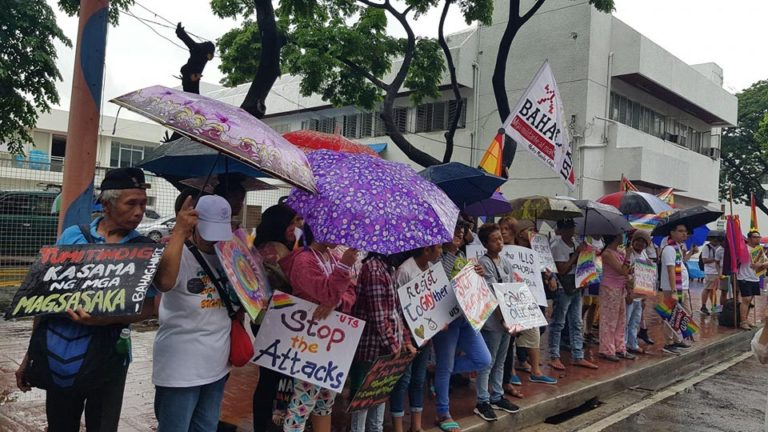
By ALYSSA MAE CLARIN
Bulatlat.com
MANILA— Despite the heavy onslaught of rain, members of the progressive LGBT group Bahaghari clutched their placards closer to their chest as they chanted louder under the beating rain, “Makibeki! Wag ma-shokot!”
The group, joined by their allies from the church community and the farming sector, raised their fists and voices regarding different social issues regardless of the bad weather and the overwhelming number of people in celebration.
Still, despite its activist roots, Pride March has been slowly becoming a commercialized affair where big companies can don on their rainbow-themed products and use the hype of the Pride Month to market themselves further to members of the LGBT community.
Pink capitalism
There will always be a noticeable rise in rainbow-themed items from big corporations as soon as June starts, suddenly people are wearing rainbow shirts, using rainbow mugs, and posting about rainbow-themed items that are being sold by international companies.
Stores would conduct big ‘pride sales’ to garner the attention of the public, and attract possible consumers from the community.
This phenomenon is called Pink capitalism or Rainbow capitalism, or the incorporation of the LGBT movement, the fight for diversity and acceptance, as a way to capitalism and the market economy.
The way big companies had monetized the celebration of Pride, identifying themselves as one of them whenever June comes rolling in, and forgetting about the agenda as soon as the calendar hits July has raised skepticism from the community, for treating their month-long protest and celebration as an all-you-can-eat buffet of marketing and PR ideas.
When asked about the group’s opinion on this kind of marketing scheme, Bahaghari chair Bernadette Neri just said that people have different ways of celebrating Pride, “It’s good if they [big companies] are really allies of the community, but we have to remember that being allies does not mean only being ally during Pride Parades. Being an ally means acknowledging the LGBT sector every day of every year.”
“For the longest time, these issues haven’t been highlighted in every celebration of Pride particularly on big celebrations like this,” said Neri, ironically.
Neri said that it was upsetting that Pride had come to a point where most of the people marching were from big corporations, “It’s a big problem, from our perspective.”
Pride March is the only time of the year where voices of the people from the LGBT community could be heard loud and clear and yet the protest of Bahaghari have been overshadowed, “Literally!” added Neri and gestures to the megaphone the group has been using, by the celebration and the booming sound systems.
“It’s ironic,” said Neri, “Because this should be an event where the plights of LGBT from different sectors are highlighted and yet, we are outdone by celebration. It’s why it all seems like a big façade, superficial in a way.”
According to Neri, if companies and corporations are truly supporters of the community, they should be against ‘contractualization,’ a thing that has been plaguing LGBT members currently under the working sector.
“In short, the current form of big Pride Marches is an avenue for companies to use the concept of pride for commercialization, for LGBT but only at the level of gender politics and never beyond that. It’s truly not for the betterment of the community, and for what they are fighting for.”
Neri said that Pride March is an avenue for the LGBT and its allies to celebrate, despite our different ways of celebration; whether it be through protest or through festival-like celebrations like what the annual Pride Parade has been known for these past few years.
“This kind of gathering is very important. And people have different ways and capabilities of fighting. But our only request, always, is for people to always remember that Pride is originally rooted from its militant tradition, and never forget that our [LGBT community] issues goes beyond issues of sexuality,” said Neri, adding how the protest of the LGBT should also incorporate issues from different sectors, where many members of the community are still experiencing discrimination.
Bahaghari has been a blatant supporter of the plight of the farmers, and workers sector, and has been known to integrate them into their protest movements.
The post Pride agenda and pink capitalism appeared first on Bulatlat.
